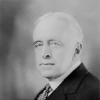Irving Babbitt

Irving Babbitt
Irving Babbittwas an American academic and literary critic, noted for his founding role in a movement that became known as the New Humanism, a significant influence on literary discussion and conservative thought in the period between 1910 and 1930. He was a cultural critic in the tradition of Matthew Arnold and a consistent opponent of romanticism, as represented by the writings of Jean-Jacques Rousseau. Politically he can, without serious distortion, be called a follower of Aristotle and Edmund Burke. He...
NationalityAmerican
ProfessionCritic
Date of Birth2 August 1865
CountryUnited States of America
One should, therefore, in the interests of democracy itself seek to substitute the doctrine of the right man for the doctrine of the rights of man.
One of our federal judges said, not long ago, that what the American people need is ten per cent of thought and ninety per cent of action.
Act strenuously, would appear to be our faith, and right thinking will take care of itself.
Democracy is now going forth on a crusade against imperialism.
To say that most of us today are purely expansive is only another way of saying that most of us continue to be more concerned with the quantity than with the quality of our democracy.
To harmonize the One with the Many, this is indeed a difficult adjustment, perhaps the most difficult of all, and so important, withal, that nations have perished from their failure to achieve it.
We may affirm, then, that the main drift of the later Renaissance was away from a humanism that favored a free expansion toward a humanism that was in the highest degree disciplinary and selective.
It is well to open one's mind but only as a preliminary to closing it ... for the supreme act of judgment and selection.
If a man went simply by what he saw, he might be tempted to affirm that the essence of democracy is melodrama.
If quantitatively the American achievement is impressive, qualitatively it is somewhat less satisfying.
Robespierre, however, was not the type of leader finally destined to emerge from the Revolution.
The humanitarian would, of course, have us meddle in foreign affairs as part of his program of world service.
Inasmuch as society cannot go on without discipline of some kind, men were constrained, in the absence of any other form of discipline, to turn to discipline of the military type.
The true humanist maintains a just balance between sympathy and selection.